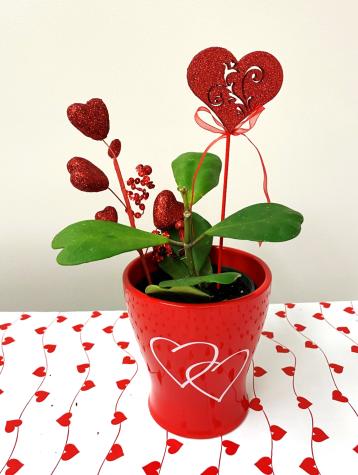COLUMBIA, Mo. – Red roses have long been a hallmark of Valentine’s Day. But the beauty of fresh flowers is fleeting, while a houseplant can be a long-lasting expression of affection.
Houseplants with heart-shaped leaves can be just the right gift for a special person, says University of Missouri Extension horticulturist Michele Warmund, who has a few suggestions for picking that perfect plant.
“There are actually quite a few plants that produce leaves I would consider heart-shaped,” Warmund says. “They all vary in care and requirements, so there should be one perfect for everyone’s needs.”
Heartleaf philodendron (Philodendron hederaceum) is a vining plant that prefers medium to bright indirect light. Keep it in a highly organic potting medium that is kept barely moist. Philodendron can be fertilized every three to four months.
Golden pothos (Epipremnum aureum) is another vining plant that prefers bright indirect light and thrives when the potting medium is moderately dry between waterings. Fertilize every three months.
Sweetheart hoya (Hoya kerrii) is a tropical succulent vine that can produce fragrant clusters of small, red flowers in the summer. Plants require light for flowering, but no more than two hours of bright sunlight per day. Don’t overwater or overfertilize in the winter.
String of hearts (Ceropegia linearis) is a vine that can develop fountain-like flowers in the summer or fall. These succulent plants prefer plenty of bright indirect light, and the potting medium should become medium to dry before watering. They require infrequent fertilizing.
Heart fern or tongue fern (Hemionitis arifolia) is typically found in tropical forests, so it grows best in a humid environment with bright indirect light. Keep the potting medium moist but not wet, and fertilize monthly with a fertilizer diluted by 50%.
Cyclamen plants have heart-shaped leaves and produce flowers for several months when kept in bright light. Water regularly when flowering. After flowering, the plant can, with a bit of effort, be forced into bloom once again after a period of rest.
Anthurium plants are a showy Valentine’s Day option. They produce flowers continuously and thrive in bright indirect light. Water thoroughly and fertilize sparingly, about once a month. Anthurium plants are poisonous, so keep them out of reach of small children and pets.
